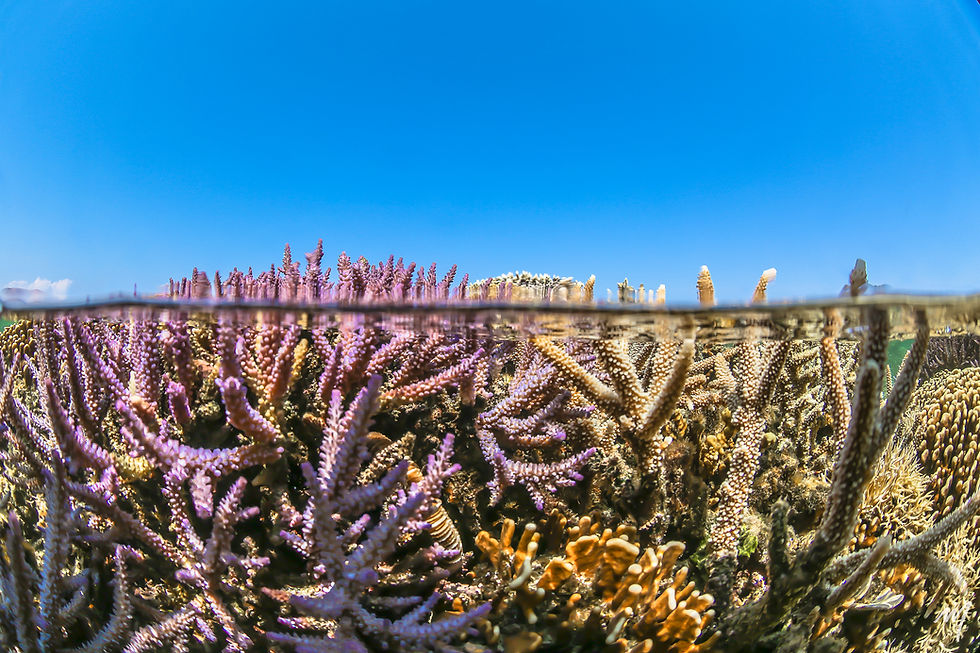
Coral reefs, often called the “rainforests of the ocean,” are among the most diverse and precious ecosystems on the planet. These fascinating structures cover only a small portion of the seabed, but their role in ocean health and global ecological balance is absolutely crucial. They are home to extraordinary biodiversity and play a key role in protecting coastlines, regulating the climate, and supporting local economies. Let’s find out why coral reefs are so important and why their preservation is a global priority.
1. A habitat for exceptional marine biodiversity
Although coral reefs make up only 0.1% of the ocean surface, they are home to about 25% of all marine species. They are rich and complex ecosystems, providing habitat for thousands of species of fish, mollusks, crustaceans, sponges and other marine life. Coral reefs are essential for the reproduction, growth and protection of many marine species.
This biodiversity is not limited to aesthetics or science. It has direct implications for the health of the oceans as a whole. Coral reefs function as reservoirs of biodiversity, allowing many species to thrive and interact in complex ecological networks. Without these reefs, much of the marine life would disappear, disrupting the balance of marine ecosystems.
2. Natural protection against storms and coastal erosion
Coral reefs are not only vital for biodiversity, they also play a crucial role in protecting coastlines from erosion and storms. By acting as natural barriers, reefs absorb up to 97% of wave energy, protecting coastlines from storms, tsunamis and erosion. This is particularly important in tropical regions where storms are frequent and coastal infrastructure is vulnerable.
This natural protection helps preserve beaches, coastal habitats, and homes and infrastructure located near the coast. Without coral reefs, coastal communities would be much more exposed to the destructive forces of the sea, with dramatic economic and social consequences.
3. Essential support for local economies
Coral reefs play a fundamental role in the economy of many parts of the world, particularly through fisheries, tourism and agriculture. They support millions of people by providing food resources and creating jobs. Small-scale fisheries depend directly on reefs for the reproduction and survival of many species of fish. In addition to this, reefs attract millions of tourists each year, particularly for scuba diving and marine wildlife viewing, generating billions of dollars for local economies.
Reef tourism is also an important source of income for coastal communities, particularly in developing countries. However, this influx of tourists must be managed sustainably to avoid disrupting sensitive reef ecosystems.
4. A crucial role in climate regulation
Coral reefs also help regulate the global climate. Corals play a key role in the carbon cycle by fixing carbon dioxide (CO2) in the form of calcium carbonate in their skeletons. This helps regulate CO2 levels in the atmosphere and limit ocean acidification, which is one of the consequences of climate change.
However, coral reefs themselves are particularly vulnerable to climate change. Rising ocean temperatures are leading to coral bleaching events, where corals lose their symbiotic algae (zooxanthellae), which are essential for their survival. If these events increase, reefs could die, which would have devastating effects on marine biodiversity and climate regulation.
5. An emergency for preservation
Despite their importance, coral reefs are in grave danger. Climate change, plastic pollution, overfishing and unsustainable coastal development threaten their survival. Coral reefs have already halved in the last 30 years, and if no action is taken, they could disappear completely by the end of the century.
Preserving coral reefs is therefore a global priority. Conservation initiatives such as creating marine protected areas (MPAs) , restoring reefs through coral gardening or reducing greenhouse gas emissions are essential for their survival. Every action counts, and we all have a role to play in protecting these unique ecosystems.
Conclusion
Coral reefs are more than just underwater gems. They are essential pillars of marine biodiversity, natural protectors against storms, and major economic players for millions of people around the world. Their disappearance would have catastrophic consequences, not only for marine life, but also for the human communities that depend on them.
There is an urgent need to act to protect these fragile ecosystems and support conservation initiatives that will allow reefs to regenerate and continue to play their vital role in the oceans. Whether through awareness raising, local actions or reducing our ecological footprint, we can all contribute to the preservation of coral reefs.
Scientific references
Hoegh-Guldberg, O., et al. (2007). Coral Reefs Under Rapid Climate Change and Ocean Acidification . Science, 318(5857), 1737-1742.
Hughes, TP, et al. (2017). Global warming and recurrent mass bleaching of corals . Nature, 543(7645), 373-377.
Moberg, F., & Folke, C. (1999). Ecological goods and services of coral reef ecosystems . Ecological Economics, 29(2), 215-233.


